Nauru, 8 Dhulqa’dah 1437/11 August 2016 (MINA) – The devastating trauma and abuse inflicted on children held by Australia in offshore detention has been laid bare in the largest cache of leaked documents released from inside its immigration regime.
The Guardian has reported more than 2,000 leaked incident reports from Australia’s detention camp for asylum seekers on the remote Pacific island of Nauru – totalling more than 8,000 pages – are published by the Guardian today. The Nauru files set out as never before the assaults, sexual abuse, self-harm attempts, child abuse and living conditions endured by asylum seekers held by the Australian government, painting a picture of routine dysfunction and cruelty.
The Guardian’s analysis of the files reveal that children are vastly over-represented in the reports. More than half of the 2,116 reports – a total of 1,086 incidents, or 51.3% – involve children, although children made up only about 18% of those in detention on Nauru during the time covered by the reports, May 2013 to October 2015. The findings come just weeks after the brutal treatment of young people in juvenile detention in the Northern Territory was exposed, leading to the Australian prime minister, Malcolm Turnbull, announcing a wide-ranging public inquiry.
The reports range from a guard allegedly grabbing a boy and threatening to kill him once he is living in the community to guards allegedly slapping children in the face. In September 2014 a teacher reported that a young classroom helper had requested a four-minute shower instead of a two-minute shower. “Her request has been accepted on condition of sexual favours. It is a male security person. She did not state if this has or hasn’t occurred. The security officer wants to view a boy or girl having a shower.”
Also Read: Cambodia Urges Immediate Ceasefire with Thailand at UN
Some reports contain distressing examples of behaviour by traumatised children. According to a report from September 2014, a girl had sewn her lips together. A guard saw her and began laughing at her. In July that year a child under the age of 10 undressed and invited a group of adults to insert their fingers into her vagina; in February 2015 a young girl gestured to her vagina and said a male asylum seeker “cut her from under”.
In the files there are seven reports of sexual assault of children, 59 reports of assault on children, 30 of self-harm involving children and 159 of threatened self-harm involving children.
The reports show extraordinary acts of desperation. One pregnant woman, after being told she would need to give birth on Nauru in October 2015, was agitated and in tears. “I give my baby to Australia to look after,” she pleaded with a caseworker, adding: “I don’t want to have my baby in PNG, the [Nauru hospital] or have it in this dirty environment.”
The files raise stark questions about how information is reported on Nauru, one of Australia’s two offshore detention centres for asylum seekers who arrive by boat. They highlight serious concerns about the ongoing risks to children and adults held on the island. They show how the Australian government has failed to respond to warning signs and reveal sexual assault allegations – many involving children – that have never been previously disclosed.
Also Read: 12 Killed as Thai-Cambodia Border Conflict Intensifies with Airstrikes and Rocket Fire
The most damning evidence emerges from the words of the staff working in the detention centre themselves – the people who compile the reports. These caseworkers, guards, teachers and medical officers have been charged with caring for hundreds of asylum seekers on the island.
The publication is likely to renew calls for an end to the political impasse that has seen children in Australia’s care languish on Nauru for more than three years.
Nauru is the world’s smallest island state, home to fewer than 10,000 people. Australia supplies aid and buys services from Nauru’s government and companies, leading to accusations Nauru is effectively a “client state”. On the last official count at the end of June, 442 people – 338 men, 55 women and 49 children – were held in the Nauru regional processing centre. The other offshore centre, on Manus Island in Papua New Guinea, was holding 854 people, all men. Australia’s policy has been criticised regularly by the UN.
The Guardian is publishing the files because it believes Australians have the right to know more about the regime at the Nauru and Manus centres, which costs Australian taxpayers $1.2bn a year.
Also Read: Border Tensions Escalate: Thailand Expels Cambodian Envoy Over Landmine Allegations
The documents cover the period examined in a review into allegations of sexual assault, the Australian Human Rights Commission’s inquiry into children in detention as well as the period examined by a Senate inquiry and beyond. They encompass the final days of Labor’s time in government and the ruling conservative Coalition’s time in office since September 2013.
In each successive inquiry, the Australian government and its contractors, including Broadspectrum (formerly Transfield Services) and its subcontractor Wilson Security, have maintained that they are improving conditions and reporting measures to raise the quality of life on the island.
In April 2015 the Australian immigration minister, Peter Dutton, said he wanted to make Nauru a “safe environment”. He said he had “instructed the department to do whatever they possibly can, both domestically within the detention network here and with our partners in the regional processing centres, to make sure that the standard of care is as high as it possibly can be”.
Wilson Security has previously told the Australian parliament it had “robust policies, procedures and processes that support the operations in Nauru”.
Also Read: China Issues Nationwide Heat Alert as Power Grid Faces Record Demand
It continued: “Allegations of sexual assault are treated in a timely and sensitive manner. Where Wilson Security receives an allegation we take immediate action following disclosure or notification.”
But the files show a very different picture. Rather than serious events diminishing, they continued – and in some cases escalated – during the course of 2015. A vast number of incidents from across the timeframe have never before been reported.
Many asylum seekers held on Nauru were unable to leave the detention compounds during the period covered by the files. Some had been granted permission to leave on day trips but were closely monitored to ensure they returned before curfews. Those found to be refugees were released into the Nauruan community – yet still remain effectively detained on the remote island.
The primary evidence from the files backs up testimony from former immigration detention staff members interviewed by the Guardian as part of its investigation.
Also Read: Bangladeshi Air Force Jet Crashes into School Campus, Killing 20
Access to Nauru is tightly controlled. Events on the island are reported sporadically through refugee advocates and whistleblowers, but the Australian government’s policy of shrouding its offshore detention centres in secrecy has prevented the reporting of many serious incidents. The Nauru files shatter that secrecy.
In response to the Nauru files, the Australian Department of Immigration and Border Protection said in a statement: “The Australian government continues to support the Nauruan government to provide for the health, welfare and safety of all transferees and refugees in Nauru.
“The documents published today are evidence of the rigorous reporting procedures that are in place in the regional processing centre – procedures under which any alleged incident must be recorded, reported and where necessary investigated. Many of the incident reports reflect unconfirmed allegations or uncorroborated statements and claims – they are not statements of proven fact.
“All alleged criminal incidents within the regional processing centre are referred to the Nauru Police Force (NPF) for investigation. Refugees living in the community are encouraged to report all criminal incidents to the NPF. A number of matters remain under active investigation.
Also Read: Indonesian FM Facilitates Release of Its Citizen Detained in Myanmar
“The department is examining the matters published today to ensure all of these matters have been reported appropriately by service providers, consistent with the policies and procedures covering such matters.”
The department added that it “also takes seriously its role in supporting the government of Nauru to protect children from abuse, neglect or exploitation”.
Sexual violence and threats
Allegations of sexual assault, particularly against young women, are a persistent theme of the files. In one report an asylum seeker described being told she was “on a list” written by local Nauruan guards naming single women they were “waiting for”. “She has received offers to get her pregnant when she gets out,” the caseworker wrote.
They reveal allegations of misconduct by Wilson Security guards at the detention centre. In one report a “cultural adviser” for Wilson Security, the company that employs guards at the detention camp, allegedly told an asylum seeker who had been sexually assaulted in camp that “rape in Australia is very common and people don’t get punished”.
Also Read: Australian PM Condemns Attacks on Aid Seekers in Gaza
The caseworker who filed the report wrote that the female asylum seeker also told her the guard had questioned whether the sexual assault had occurred and said: “If that happened to you why didn’t you scream at the time?”
“You have to take it out of your head if you go into Nauru then he [the alleged perpetrator] could be your neighbour or if you go to Cambodia then he could be on the plane next to you,” the adviser reportedly told the woman. “You also have to teach your son to treat this man nicely.”
There are allegations that bus drivers – employed by Australia’s detention contractors – took voyeuristic pictures of women in the camp to use to masturbate. Other reports range from a man facing threats of sexual violence from other asylum seekers to a woman threatening self-harm because she doesn’t want “men to touch her body”.
Speaking before the publication of the Nauru files, Prof Louise Newman, a former member of the Immigration Health Advisory Group, says such attacks have continued. She speaks “on a nightly basis” to women on Nauru who have been sexually assaulted.
Also Read: Half of Afghan Children Face Severe Food Poverty
“I am prepared to say the sexual assault of women is a major problem on Nauru,” Newman says. “Some of the women’s descriptions of what is happening to them is incredibly alarming in terms of the lack of process.
“It’s not just one incident. If it was one incident and there had been a poor response in a developing nation then maybe it was something to work on. I think what we’re seeing is a systemic lack of processes and understanding of this.”
Trauma and self-harm
Health and medical experts have consistently warned of the mental harm caused by prolonged detention. The files show in graphic detail how this harm has manifested.
Also Read: Islamabad High Court Rejects Plea to Halt Forced Deportation of Afghan Migrants
One man asked a caseworker where he could buy bullets so he could get someone else to shoot him. A woman sharpened a pencil with a razor blade, then cut her wrists. Another wrapped a rope around her neck and tried to hang herself. She had to be held up by guards until she could be cut down.
In one report from January 2015, a teenage girl struggled to cope after her mother’s miscarriage. She began having “ongoing hallucinations from a ‘small person’ ”, a Save the Children worker wrote.
“She is unsure if it is a man or women but has a dark face and is the size of a child.” The hallucination had threatened to kill her: “At other times the hallucination is encouraging [REDACTED] to kill herself.”
The toll on children’s mental health is particularly heavy. According to an April 2015 report a girl began screaming “uncontrollably” during a fight in a recreation tent.
Also Read: Afghanistan, Pakistan, and Uzbekistan Agree to Strengthen Trade and Transport Links
“During this time [REDACTED] also gouged at her own face consistently and pulled her own hair,” the child protection officer wrote. “It was observed that [REDACTED] could not breath properly and had a glazed look in her eyes.”
Other files show the anguished outbursts to which some asylum seekers have become prone since their detention: one report described a woman seeking a bandage after punching a metal pole with both hands. Another told of a woman who began banging her head with her fists after an altercation with guards. Another woman carved her husband’s name on to her chest; she wanted a tattoo but could not get one so used a knife instead. Her husband lives in Australia.
Speaking to the Guardian before the publication of the Nauru files, Dr Peter Young, a former medical director of mental health for Australia’s immigration detention system, said: “Self-harm and suicide attempts increase steadily after six months in detention. This is driven by hopelessness which is known to be the strongest predictor of suicide.
“Some self-harm, such as lip sewing, has a protest element and is common in prisoners as an expression of feeling powerless and voiceless.”
Squalor
Other reports show the squalor and the difficulties getting medical treatment. One female asylum seeker, who has urinary incontinence, complained about how she was no longer provided with sanitary pads to treat the condition.
According to another report a female guard allegedly refused to let a child under 10 use a toilet and made her squat on the ground instead. Her mother told a caseworker the guard had then shone her torch on the girl’s genitals.
The logs illustrate the squalid conditions often experienced by asylum seekers at the centre, including frequent complaints of cockroaches infesting tents housing the detainees.
One report showed how the companies’ failure to communicate traumatises asylum seekers. The medical provider International Health and Medical Services ran a “mass casualty simulation” that had people daubed with fake blood walking around. But the plan was not reported to the Save the Children teachers at the nearby school.
“The incident prompted every student to start talking about incidents of self-harm they had witnessed,” a teacher wrote. “They did not know this one was false and so were forced to experience another incident at school, which should be a safe, distracting environment.”
Nauru files reporting team: Paul Farrell, Nick Evershed, Helen Davidson, Ben Doherty, Ri Liu, Anna Livsey, David Constable, Tom Ross, Josh Wall, Nikki Marshall, Merran Hitchick and Patrick Keneally
• In Australia, the crisis support service Lifeline is on 13 11 14. In the US, the National Suicide Prevention Hotline is 1-800-273-8255. In the UK, the Samaritans can be contacted on 116 123. Hotlines in other countries can be found here (T/R04)
Mi’raj Islamic News Agency (MINA)





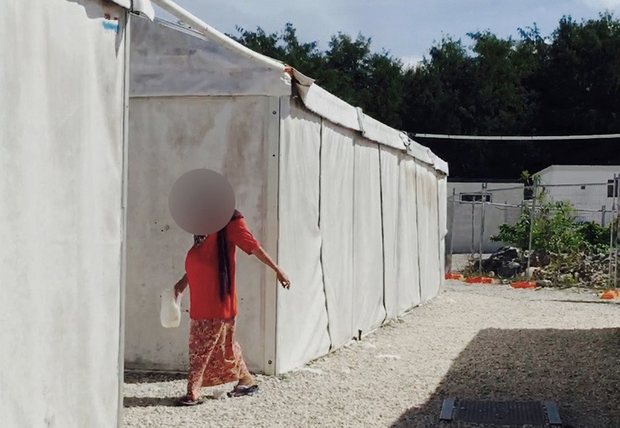

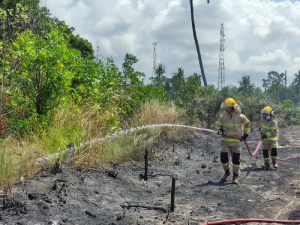
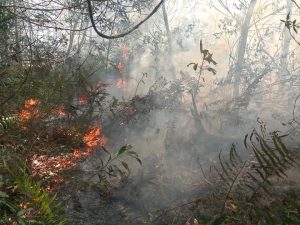



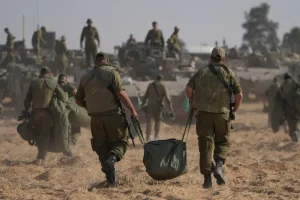

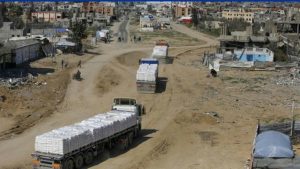
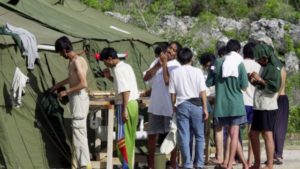
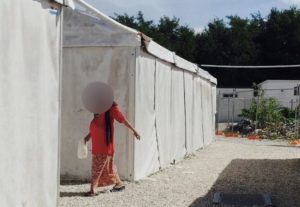




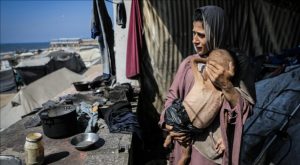
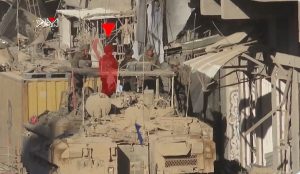
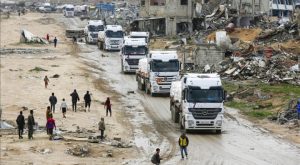


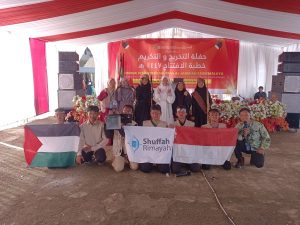



 Mina Indonesia
Mina Indonesia Mina Arabic
Mina Arabic